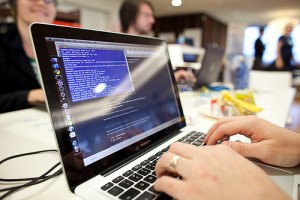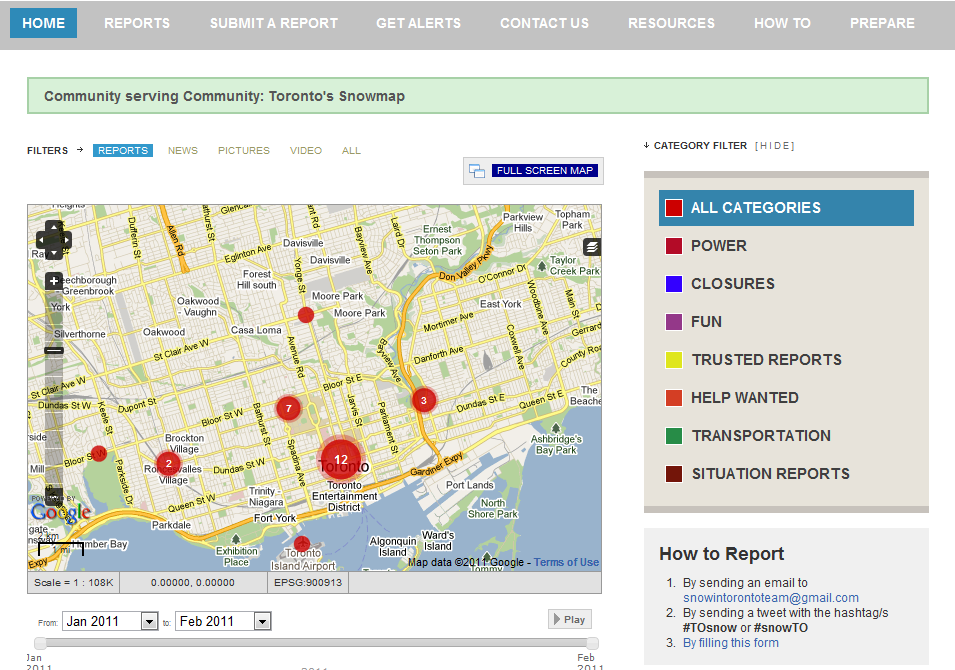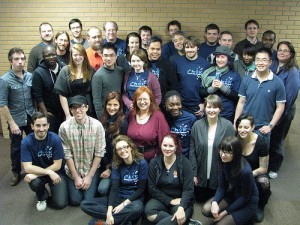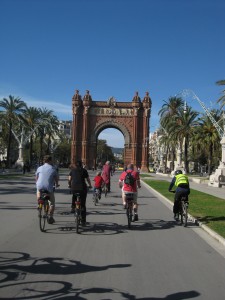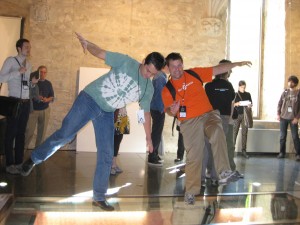Virtual participation for geek, technical or social events helps the sting of not being able to attend in person. While it can’t completely fill the void of shared, human interaction, at least you can potentially watch a stream, catch a liveblog or even find a new person to follow who inspires you.
South by South West – Interactive starts tomorrow. Every year I make a wish list of sessions that I would either attend or research. Then, I seek out the content and presenters before, during and after the events. It also gives me a chance to support some friends and thought leaders from afar. The list below is an eclectic mix of interests. There are folks from CrisisCommons, Ushahidi, OpenStreetMap, UN Global Pulse, Frontline SMS, Movements.org, NPR (Andy Carvin), Mozilla, P2PU, Toronto friends, and more. I know that I have missed some good people and welcome the tips. Also included are topics that perked my interest or topics that I know friends or family members research.
As you can tell, I would need to be cloned multiple times over to virtually monitor all of these sessions. And, put the rest of my scheduled activities on hold. Most of the sessions have hashtags and might have streaming. Last year I was able to cobble participation together for 10 sessions. I am mainly following #sxswgood for my Technology-for-Social-Good @ SXSW fix.
The Virtual SXSW Schedule (subject to whim and edits)
Austin Time translator – all times in CST Standard time zone: UTC/GMT -6 hours
(Note: DST starts on the weekend. On Sunday, switch to UTC/GMT -5 hours)
What time is it for me?
Friday, March 11, 2011
14:00 Lessons Learned from the Arab Spring Revolutions – Susannah Vila (movements.org)
14:00 Fireside Chat: Tim O’Reilly Interviewed by Jason Calacanis
14:00 Rebooting Iceland: Crowdsourcing Innovation in Uncertain Times
15:30 The Future of WordPress
17:00 The Singularity is HERE (cousin’s research area)
Saturday, March 12, 2011
9:30 Putting the Public Back in Public Media Andy Carvin
9:30 Federating the Social Web
11:00 Agile Self-Development
More details.
11:00 We Are Browncoats: Leveraging Fan Communities for Charity Serenity!
11:00 Seed & Feed: How to Cultivate Self-Organizing Communities (New Work City – for @camaraderie)
11:00 Flattr w/Thingiverse, Readability, Demotix: Rewarding Creators and Crowdfunding
#FlattrSXSW
12:30 Time Traveling: Interfaces for Geotemporal Visualization
12:30 Mobile Health in Africa: What Can We Learn?
Josh Nesbitt Frontline SMS #AmHealth
12:30 How Social Media Fueled Unrest in Middle East New York Times
14:00 Keynote Simulcast: Seth Priebatsch Gaming!
15:30 Humans Versus Robots: Who Curates the Real-Time Web?
15:30 The Behavior Change Checklist. Down With Gamefication Aza Raskin
15:30 Real World Moderation: Lessons from 11 Years of Community
Metafilter
15:30 Social Media Data Visualization: Mapping the World’s Conversations
16:00 Sleeping at Internet Cafes: The Next 300 Million Chinese Users
17:00 All These Worlds Are Yours: Visualizing Space Data
17:00 Web Anywhere: Mobile Optimisation With HTML5, CSS3, JavaScript
Sunday, March 13, 2011
9:30 Radical Openness: Growing TED by Giving it Away
9:30 One Codebase, Endless Possibilities: Real HTML5 Hacking
11:00 Hacking the News: Applying Computer Science to Journalism
11:00 The Future of Philanthropy: Social Giving Takes Off
#socialgiving More Details
12:30 Fail Big, Fail Often: How Fear Limits Creativity
12:30 Influencers Will Inherit the Earth. Quick, Market Them! Sloane Berrett
12:30 Urban Technology on the Dark Side
15:30 Nonprofits and Free Agents in A Networked World Beth Kantor
15:30 Paying with Data: How Free Services Aren’t Free (Privacy, NYT, Stanford)
Monday, March 14
9:30 Tweets from September 11 Schuyler Erle
9:30 Method Tweeting for Non Profits (and Other Players) Geoff Livingston
9:30 Machine Learning and Social Media
11:00 SOS – Can Citizen Alerts Be Trusted? Patrick Meier, Chris Blow, Robert Kilpatrick and Karen Flavell
11:00 Worst Website Ever II: Too Stupid to Fail
11:00 The SINGULARITY: Humanity’s Huge Techno Challenge
(My cousin’s research area)
11:00 Naked Dating: Finding Love in 140 Characters or Less Melissa Smich and Jeremy Wright
11:00 Cryptography, Technology, Privacy: Philip Zimmermann, Inventor of PGP
12:30 NPR’s API: Create Once, Publish Everywhere
15:30 Mozilla School of Webcraft @P2PU John Britton
15:30 Voting: The 233-Year-Old Design Problem
17:00 DIY Diplomacy: Designing Collaborative Gov Noel Dickover
Tuesday, March 15
11:00 Creating a Social Hackathon for the Good – Justice League Style
12:30 Wikileaks: The Website That Changed the World?
12:30 How Governments are Changing Where Big Ideas Happen Ian Kelso, Interactive Ontario
15:00 Next Stage: Bike Hugger’s Built: A Series of Talks by People Who Create
15:30 Interoperable Locations: Matching Your Places with My Places Kate Chapman
15:30 The Wonderful Things in Internet of Things
15:30 Techies Can Save the World, Why Aren’t They?
17:00 Bruce Sterling, closing speaker
17:00 Voices From The HTML5 Trenches: Browser Wars IV Mozilla, Google and more
Brain infusion pending.
Heather
